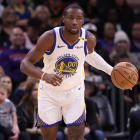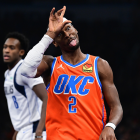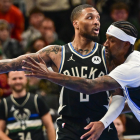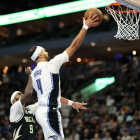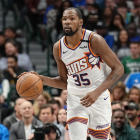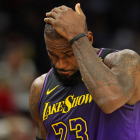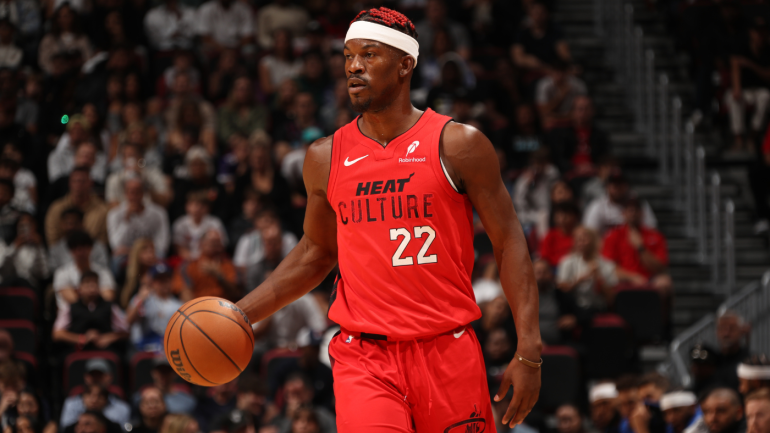
Jimmy Butler was the best player on an Eastern Conference champion 18 months ago. Players like that almost never become available, especially when they're two-way wings, the NBA's scarcest commodity. Mere whispers of his availability should be enough to drive the entire league into a frenzy, much like they did when the Milwaukee Bucks were floundering badly enough a few weeks ago for the Giannis Antetokounmpo rumor mill to begin.
But if you actually list out every trait besides "is very good" and "plays the right position," you start to understand the hesitancy here. Butler is old, having turned 35 before the season began. He's never suffered a season-ending, career-altering injury, but he hasn't played 70 games in a season since 2017. He doesn't shoot 3s. He's a bit cantankerous. Oh, and he's expected to opt out of his contract after the season in search of one last payday.
That last bit is key here. Butler on the right team could swing the championship race. But Butler on practically any team is impending financial doom. We're living in Apron World now. Paying an injury-prone non-shooter in the back half of his 30s max money or something close is the sort of risk that knocks you out of the championship race for years at a time. At the price point Butler is likely negotiating from, even a slight decline could be disastrous. The Pelicans can't drum up a market for Brandon Ingram, who's almost a decade younger. Sure, you could just elect not to pay Butler, but then you're lighting trade assets on fire for a single championship push. Who is confident enough to take a risk like that? Who wants to win right now badly enough to deal with any of this?
Neither of the two wishlist teams in Butler's home state make much sense at this point. Houston Rockets general manager Rafael Stone even went on SiriusXM NBA Radio Tuesday to tell the world that he doesn't plan to make a major trade this season. If he was going to, why would it be for Butler? The Rockets already have a shooting deficiency, ranking 17th in the NBA in 3-point attempts and 26th in 3-point percentage. Six of their eight most-used players are 23 or younger. By the time they're ready to win, Butler won't be.
The fit is easier to imagine in Dallas. The Mavericks aren't a high-volume shooting team, but they make the 3s they take. Butler wouldn't exactly space the floor for Luka Doncic and Kyrie Irving while they work, but a third creator would ease their burden some and his defense would be welcome anywhere.
The real problem for Dallas is cost. Butler makes almost $49 million, and the Mavericks, as a team hard-capped below the first apron, would have an extremely hard time taking in such a salary. They have only around $500,000 in room below that line right now. Only Doncic and Irving make more than $17 million, and without Klay Thompson, everyone is below the $15 million line. If you assume those three are off of the table, Dallas would therefore have to stack at least four other players to match Butler's salary before even considering draft-pick compensation. Forget about the serious internal questions like "is Jimmy Butler worth all of our depth?" that such a move would raise and think about the logistical concerns at play here. We're in the middle of the season. How would the Mavericks and Heat find all of the extra roster spots they'd need to make a trade like this possible? Does a team that just made the NBA Finals really want to jump through all of these hoops?
You'll hear about plenty of high-profile stealth suitors in the coming weeks. They all fail the smell test in some way or another. Denver would love another shot-creator, for instance, but they'd have to trade Michael Porter Jr. to make the money work. That would be a net loss of almost five 3-point attempts per game for the team that already takes the fewest of them in the league. The Lakers have way too many problems to fire their remaining bullets at a single player. The Knicks don't have any bullets left to fire. The 76ers face a more extreme version of the Dallas financial dilemma unless Paul George is on the table.
These are the perils of trying to trade a player like Butler. It's hard to find a team that can accommodate players who don't shoot. It's hard to find a team that accommodate a huge salary in the middle of the season. It's hard to find a team that's all-in enough to take on a 35-year-old. You're not asking a team to deal with one of those things with Butler. You're asking them to deal with all of them. It takes the perfect alignment of circumstances for such a trade to be feasible.
Fortunately, the one team that's seemingly positioned to actually pull this kind of deal off happens to be on Butler's wishlist. The one and only team that makes sense for Butler is the Golden State Warriors.
It would be hard to call age a deterrent for Golden State when Stephen Curry is older than Butler and Draymond Green isn't far behind. The Warriors are old as is. Sure, they'd like to remain competitive after those guys are gone, but the two timelines era is over. This summer's pursuit of Paul George, and to a lesser extent Lauri Markkanen, are evidence enough that the Warriors are all-in on the present. They have Curry and Green playing like themselves now. That might not be the case much longer, so they might as well take advantage while the opportunity is available.
Golden State has been accommodating non-shooters for years. The Warriors routinely start Green next to a non-shooting center. Curry warps the gravity of the court in such a way that the Warriors don't need to worry about 3-point volume or traditional spacing in the ways that other teams do. Having Buddy Hield replace (and frankly, improve upon the recent version of) Klay Thompson helps quite a bit on this front as well. You get a lot of lineup leeway when you're starting with two of the best shooters ever.
Money is the biggest question here. The Warriors, like the Mavericks, are hard-capped at the first apron. Their team salaries are remarkably similar, with Golden State holding only around $7,000 in extra space. But Golden State has four significant advantages over Dallas financially for the purposes of a major, mid-season trade:
- Andrew Wiggins makes $26.3 million, giving the Warriors a starting point roughly $12 million higher than Dallas would have.
- De'Anthony Melton is out for the year on a $12.8 million expiring contract, meaning the Warriors have no reason to keep him. He's salary that doesn't cost them depth, essentially.
- Speaking of depth, the Warriors are routinely playing 11 or 12 players in single games. They have enough rotation-caliber talent to take the depth hit of an unbalanced trade.
- Jonathan Kuminga is both a viable centerpiece from Miami's perspective and helpful matching salary at $7.6 million. Dallas would have a potentially superior centerpiece in Dereck Lively, but considering his youth, fit, and playoff track record, he is almost certainly off the table. Kuminga, by virtue of his impending restricted free agency, is almost certainly available.
Perhaps most importantly, though, the Warriors can reasonably convince themselves that they are a Jimmy Butler away from competing for the championship. They are currently undefeated in games in which they win Curry's minutes by more than five points. When they win them by five or less, or lose them, they are 1-7. He's the only 20-point scorer on the team. He and Green are the only players averaging even four assists. Butler gets to the line for 7.5 free-throw attempts per game. No Warrior is within even three attempts. Golden State's complex, motion offense isn't a fit for everyone. Butler is not only a high enough IQ player to do so, but is coming from Miami, one of the closest approximations in the NBA.
Butler and the existing Warriors roster complement one another enough for a championship run to be viable. Golden State's finances are at least theoretically aligned in a manner capable of absorbing Butler. And most importantly, their priorities are short-term enough and their trophy case is already full enough to justify a few ugly years on the back end if it means creating even one more real chance at a fifth championship for the Curry-Green core.
There are still plenty of hurdles to clear here. Kuminga is a starting point. Miami is probably asking for more, and the Warriors have to decide how much draft capital they are comfortable parting with. At least a third team, and more likely a fourth, will be needed to make the salaries work here. Two teams dealing with the apron problems the Heat and Warriors have simply can't trade with one another one-on-one. Heck, one injury to Curry or Green could derail this whole debate.
But there is at least a viable framework here. Butler doesn't make sense for any other potential trading partner. He does for the Warriors, and if Miami really does look to trade him, it almost has to be to Golden State.










